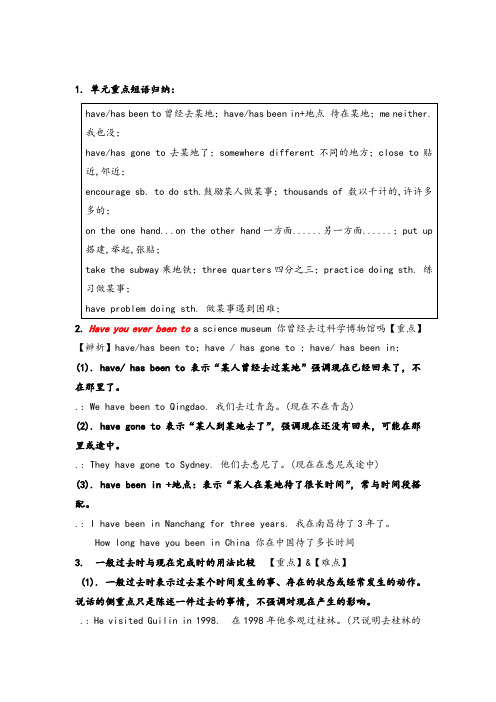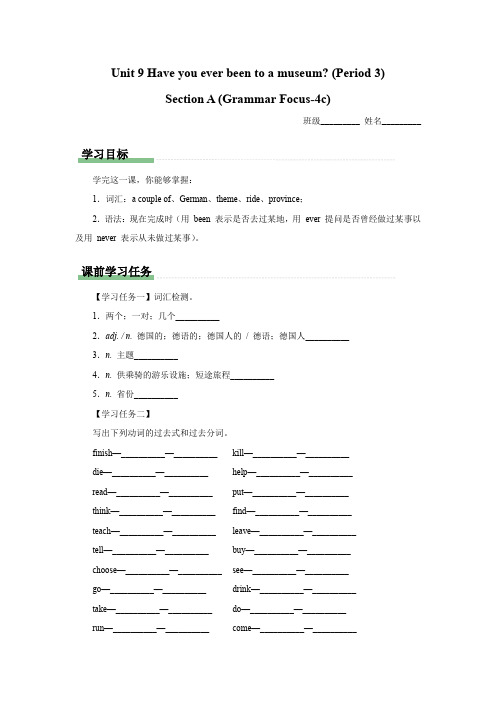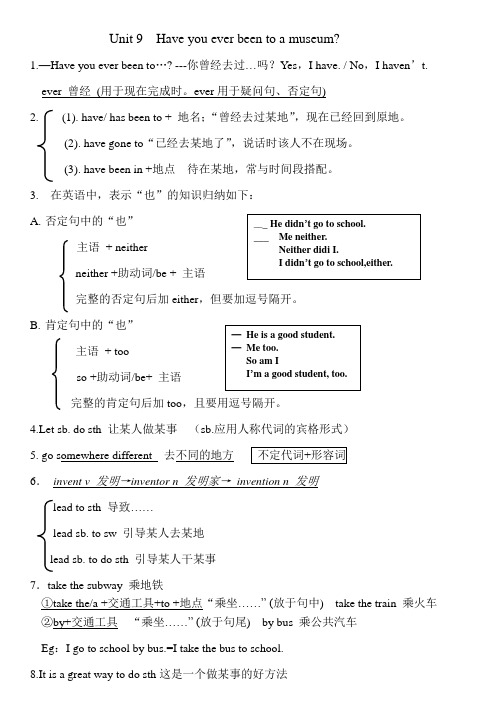Unit 9 Have you ever been to a museum? part B 教案4-优质公开课-人教新目标八下精品
unit9haveyoueverbeentoamuseum知识点梳理及单元复习

1. 单元重点短语归纳:2. Have you ever been to a science museum 你曾经去过科学博物馆吗【重点】【辨析】have/has been to;have / has gone to ;have/ has been in;(1). have/ has been to 表示“某人曾经去过某地”强调现在已经回来了,不在那里了。
.: We have been to Qingdao. 我们去过青岛。
(现在不在青岛)(2). have gone to表示“某人到某地去了”,强调现在还没有回来,可能在那里或途中。
.: They have gone to Sydney. 他们去悉尼了。
(现在在悉尼或途中)(3). have been in +地点:表示“某人在某地待了很长时间”,常与时间段搭配。
.: I have been in Nanchang for three years. 我在南昌待了3年了。
How long have you been in China 你在中国待了多长时间3. 一般过去时与现在完成时的用法比较【重点】&【难点】(1). 一般过去时表示过去某个时间发生的事、存在的状态或经常发生的动作。
说话的侧重点只是陈述一件过去的事情,不强调对现在产生的影响。
.: He visited Guilin in 1998. 在1998年他参观过桂林。
(只说明去桂林的时间)(2). 现在完成时表示动作发生在过去,对现在造成了影响或产生了结果。
不能与确定的过去时间状语连用。
.: Jill has bought a new computer. 吉尔买了一台新电脑。
I have taught here for fifteen years. 我在这儿教学已经15年了。
I have seen the film. 我看过这部电影。
(我了解这部电影的内容)I saw the film last week. 我上周看了这部电影。
人教新目标英语八年级下册讲义—Unit 9 Have you ever been to a ……

新目标八年级下册Unit 9 Have you ever been to a museum ?讲义一、重点单词1. amusement n. 娱乐; 游戏2. somewhere adv. 在某处; 到某处3. camera n. 照相机; 摄影机; 摄像机4. invention n. 发明物5. invent v. 发明; 创造1. unbelievable adj. 难以置信的; 不真实的2. progress n. 进步; 进展3. rapid adj. 迅速的; 快速的4. unusual adj. 特别的; 不寻常的5. toilet n. 坐便器; 厕所6. encourage v. 鼓励7. social adj. 社会的8. peaceful adj. 和平的; 安宁的9. performance n. 表演; 演出10. perfect adj. 完美的; 完全的11. itself pron.(it的反身代词) 它自己12. collect v. 收集; 采集13. German adj. 德国的; 德语的; 德国人的n. 德语; 德国人14. theme n. 主题15. ride n. 供乘骑的游乐设施; 短途旅程16. province n. 省份17. simply adv. 仅仅; 只; 不过18. fear v. & n. 害怕; 惧怕19. whether conj. 不管......;还是); 或者......(或者); 是否20. Indian adj.印度的 n. 印度人21. Japanese adj.;日本的; 日本人的; 日语的n. 日本人; 日语22. equator n. 赤道23. whenever conj. 在任何......时候; 无论何时24. spring n. 春天25. mostly adv. 主要地; 通常26. location n. 地点; 位置二、短语归纳1.at night在夜晚2.in a more natural environment在一个更加自然的环境中3.all year round 全年4.be far from 离……远5.in the dark 在黑暗中6.in the past 在过去7.have been to sp. 去过某地8.science museum 科学博物馆9.history museum 历史博物馆10.amusement park 游乐园11.go somewhere different 去不同的地方12.go skating 去滑冰13.take the subway 坐地铁14.a great way to spend a Saturday afternoon一个过周六下午的好方法15.all the old movie cameras所有的古老的电影摄影机16.learn about sth.解有关……的情况17.on the weekend 在周末18.camp in the mountains 在大山里露营19.put up a tent搭帐篷20.in such a rapid way 以如此迅猛的方式21.different kinds of各种各样的22.development of toilets 厕所的发展23.social groups 社会团体24.the tea art performances茶艺表演25.make a perfect cup of tea with beautiful tea sets用漂亮的茶具沏一杯完美的茶26.a nice place to enjoy tea 一个品茶的好地方27.thousands of 数以千计的28.International Museum of Toilets国际厕所博物馆29.the Terracotta Army 兵马俑30.Southeast Asia东南亚31.Night Safari 夜间动物园32.three quarters 四分之三33.an English-speaking country一个讲英语的国家34.have problem doing sth. 做某事很困难35.during the daytime在白天36.a couple of times 好几次37.right now 现在;目前38.an amusement park with a special theme一个有特别的主题的游乐园39.walk around the park 在公园里到处走40.hear of 听说41.take a ride兜风42.another province另一个省43.the Bird’s Nest鸟巢44.encourage sb. to do sth.鼓励某人做某事45.on the one hand... on the other hand.一方面,另一方面三、句型集萃1.a great way to do sth一个做某事的好办法2.It’s unbelievable that很难相信……3.watch sb do sth.看某人做了某事4.encourage sb to do sth鼓励某人做某事5.as..as和。
Unit 9 Have you ever been to a museum? 学习任务单

Unit 9 Have you ever been to a museum? (Period 3)Section A (Grammar Focus-4c)班级_________ 姓名_________学习目标学完这一课,你能够掌握:1.词汇:a couple of、German、theme、ride、province;2.语法:现在完成时(用been 表示是否去过某地,用ever 提问是否曾经做过某事以及用never 表示从未做过某事)。
课前学习任务【学习任务一】词汇检测。
1.两个;一对;几个__________2.adj. / n. 德国的;德语的;德国人的/ 德语;德国人__________3.n. 主题__________4.n. 供乘骑的游乐设施;短途旅程__________5.n. 省份__________【学习任务二】写出下列动词的过去式和过去分词。
finish—__________—__________kill—__________—__________die—__________—__________help—__________—__________read—__________—__________put—__________—__________think—__________—__________find—__________—__________teach—__________—__________leave—__________—__________tell—__________—__________buy—__________—__________choose—__________—__________see—__________—__________go—__________—__________drink—__________—__________take—__________—__________do—__________—__________run—__________—__________come—__________—__________【学习任务三】找出本单元Section A 中含有现在完成时的句子。
Unit9Haveyoueverbeentoamuseum_SectionA1a-2c课件人教版英语

Free talk Have you ever been to a/an_...? Yes, I have. /No, I haven’t.
have been to (去过),可 以与never[从没], ever [曾经], just[刚刚], once [一次], before[之前]连接。
ahsnmsciapsiawetutaruonscatrrecetmeymemrmzumeopusnuuoeastsuserepeumkuuammrmk
“我也是”结构: So+助动词/情态动词/be+主语(肯定) “So+助动词/be动词/情态动词+主语I.”=Me,too.
Drills --I have ever been to _a_s_c_i_en__ce__m__u_se_u_m___.
Have you ever been there?
回答1:Yes, __I_h_a_v_e___.
➢ 拓展:表示后者与前者情形相同,即“……也不……”时, 常用Me neither.或neither/nor引起的倒装句: Neither/Nor+助动词/系动词be/情态动词+主语.
时态上与前文保持一致,数要与其后的主语一致。
例:—I have never been to a water park.
Look at the map of the town. Listen and circle the places you hear.
2b Listen again and circle T for true or F for false.
Conversation 1
1. Tina went to the space museum last year. T/F
人教版新目标Unit9_Have_you_ever_been_to_a_museum全单元

TALK
neither have I = me neither .
I have been to the zoo a lot of times. 答语
______________ .\
. ( 我也是)
I’ve never been to a water park. 答语
____________ \ _______ . ( 我
• 1 h过某地(去过已回来);
• 2 have / has gone to +地名 去了某地(还没回来);
• 3 have / has been in +地名 在某地住了有多长。
• A: Have you ever been to the Great Wall? • B:Yes, I have. What about you? • A: Me too. • =So have I. • =I have ever been there, too. • So+助动词/be动词/情态动词+主语.
4. A: How about __g_o_i_n_g___ (go) to the art museum? There are some special German paintings there right now.
B: Sure. When do you want _t_o_g_o___ (go) ? 5. A: Have you ever __v_is_i_te_d___ (visit) the
• A: Have you ever been to the Great Wall? • B: No, I haven’t. What about you? • A: Me neither. • =Neither have I. • =I haven’t been there, either. • Neither+助动词/be动词/情态动词+主语.
人教版英语八下U9Have you ever been to a museum 讲义

Unit9 Have you ever been to a museum?一、重点词汇及拓展1. amusement n. 娱乐;游戏e.g. The old ladies played the games just for amusement.老太太们玩这个游戏只是为了取乐。
amuse v. 消遣,逗笑;使开心,使愉快amusing adj. 有趣的,好玩的,好笑的amused adj. 被逗乐的;感到好笑的2.amusement park 游乐场e.g. The amusement park is open from May through October.游乐园从五月到十月开放。
3.somewhere adv. 在何处;到某处pron. 某个地方e.g. Maybe the keys are somewhere in the dining room.也许钥匙在餐厅某个地方。
I need to find somewhere to stay tonight.我得找到今晚要住的地方。
4.camera n.照相机;摄影机;摄像机e.g. I heard your parents bought you a cameras as a gift.我听说你的父母亲给你买了一台照相机作为礼物。
5.invention n.发明;发明物e.g. Do you think mobile phone is a great invention?你认为手机是一个伟大的发明吗?6.invent v.发明;创造inventor n.发明家invention n.发明;发明物e.g. As we all know that Edison invented light bulb.我们都知道爱迪生发明了灯泡。
7. unbelievable adj. 难以置信的;不真实的unbelievably adv. 难以置信地;不真实地unbelievably bad/good 坏得/好得令人难以置信incredible adj. 难以置信的e.g. I still find this story both fascinating and unbelievable.我仍然觉得这个故事非常有趣和难以置信。
(完整版)优秀课件unit-9-Have-you-ever-been-to-a-museum

zoo
A: Have you ever been to a zoo? B: Yes, I’ve been to a zoo.
space museum 太空馆
A: Have you ever been to a space museum? B: No, I’ve never been to a space museum.
6.He has been in London for half a month. 他来伦敦已有半个月了。
1.sb.have /has been to sp. 意为“某人曾经去过某地”,
但现在已不在那里了, ”已经回来,侧重指经历,后 可接次数, 如once, twice, three times等, 表示 “去过某地几次”, 也可和 just, never, ever等连用。
4.我了解了一些电影的知识。 I _le_a_r_n_e_d_a_b_o_u_t_ some information about movie. 5.他的粗心导致了这次失败。 His carelessness _l_e_d_ _t_o_ this failure.
选用have, has填空: 1.I __h__a_v_e_ told him the news. 2.She ___h_a_s___ come back from school. 3.You ___h_a_v_e__ won the game.
2.sb.have/has gone to sp.
意为“某人已经去某地了”, 可能在去某地的路上, 也可能到达了某地。总之, 说话时该人不在现场, 一般不用第一人称、第二人称代词作句子的主语。
3.sb.have/has been in sp.
表示“在某地呆了多少时间”, 常与时间段状语连用
Unit-9--Have-you-ever-been-to-a-museum--知识整理

Unit 9 Have you ever been to a museum?1.—Have you ever been to …? ---你曾经去过…吗?Yes ,I have. / No ,I haven ’t. ever 曾经 (用于现在完成时。
ever 用于疑问句、否定句)2.(1). have/ has been to + 地名;“曾经去过某地”,现在已经回到原地。
(2). have gone to “已经去某地了”,说话时该人不在现场。
(3). have been in +地点 待在某地,常与时间段搭配。
3. 在英语中,表示“也”的知识归纳如下:A. 否定句中的“也”主语 + neitherneither +助动词/be + 主语 完整的否定句后加either ,但要加逗号隔开。
B. 肯定句中的“也”主语 + tooso +助动词/be+ 主语 完整的肯定句后加too ,且要用逗号隔开。
4.Let sb. do sth 让某人做某事 (sb.应用人称代词的宾格形式)5. go somewhere different 去不同的地方 6. invent v 发明→inventor n 发明家→ invention n 发明lead to sth 导致……lead sb. to sw 引导某人去某地lead sb. to do sth 引导某人干某事7.take the subway 乘地铁①take the/a +交通工具+to +地点“乘坐……” (放于句中) take the train 乘火车 ②by+交通工具 “乘坐……” (放于句尾) by bus 乘公共汽车Eg :I go to school by bus.=I take the bus to school.8.It is a great way to do sth 这是一个做某事的好方法9. go skating 去滑冰10. .on the weekend 在周末11. science museum 科学博物馆history museum 历史博物馆12.all the old movie cameras所有的古老的电影摄影机13.camp in the mountains 在大山里露营14.learn about 了解获知,得知learn about sth.了解有关……的情况15. an amusement park 一个游乐场16. the International Museum国际博物馆17. put up a tent 搭帐篷put up 搭起;举起;张贴rmation信息;资料(不可n.)some informationa piece of information 与about 连用,表示:“关于……的信息”19.It’s unbelievable that+从句“令人难以置信的……”20. make progress 取得进步make progress in 在......方面取得进步21.in such a rapid way 以如此迅猛的方式22.play chess 下棋23.be able to+V原能够做某事24.in the future在将来25.wonder 想要知道= want to know①后接从句eg:I wonder who she is.②也可接“疑问词+不定式”eg: I wonder what to do next.26.I couldn’t believe my eyes我无法相信我的眼睛。
- 1、下载文档前请自行甄别文档内容的完整性,平台不提供额外的编辑、内容补充、找答案等附加服务。
- 2、"仅部分预览"的文档,不可在线预览部分如存在完整性等问题,可反馈申请退款(可完整预览的文档不适用该条件!)。
- 3、如文档侵犯您的权益,请联系客服反馈,我们会尽快为您处理(人工客服工作时间:9:00-18:30)。
Unit 9 part B 教案
【教学目标】
Method Objects in Teaching
(1) Listening and speaking methods.
(2) Reading methods.
(3) Practice method.
【教学重点】
get information from the text
learn new words and expressions
【教学难点】
consolidate the new words and expressions
arise discussion and guide students to ask questions and find answers on their own 【教学方法】
PWP method, task-based method and interactive approach
【教学手段】
A tape recorder, multimedia and some pictures
【教学过程】
Teaching Procedures:
Step 1 Leading-in
Ss look the pictures and answer the questions. say as much as possible. Step 2 activity and pair work
Students discussion about the topic through pre-reading
Step 3 Language points
1. on the one hand… on the other hand 一方面……另一方面……
e.g. On the one hand, she taught English, on the other hand she learned
Chinese. 她一方面教英语, 一方面学习汉语.
2. …more than three quarters of the population are Chinese…
quarter n.四分之一;一刻钟
e.g. I've got to go in a quarter of an hour... 一刻钟以后我就得走了。
three quarters 四分之三
3. May be you fear that you won’t…
fear v. 害怕;担心
e.g. Many people fear change because they do not like the old ways to be changed.
很多人惧怕变化,因为他们不喜欢旧有的生活方式被改变。
4. A lot of animals only wake up at night…
wake v. 醒来;唤醒(woke woken)
e.g. She went upstairs to wake John. 她上楼去叫醒John。
5. seem的用法
a) “好像、似乎” , 其后加形容词。
e.g. He seems unhappy today. 他今天好像不高兴。
She seems very sad. 她似乎很伤心。
b) seem + (to be) + n.
e.g. They seem (to be) doctors. 他们好像是医生。
c) seem + (to be) + 介词
e.g. It seems like years since I last saw her.
从上次遇到她, 好像已过了许多年。
Step 4 Exercises
Translate the following phrases.
1. 在东南亚_______________
2. 四分之三人口________________________
3. 做某事有困难______________________
4. 在白天________________
5. 睡醒________
6. 处于一个自然的环境中______________________
7. 一年到头,终年_____________
Keys: in southeast Asia, three quarters of population, have problems doing sth., during the daytime, wake up, in a natural environment,all year round。
